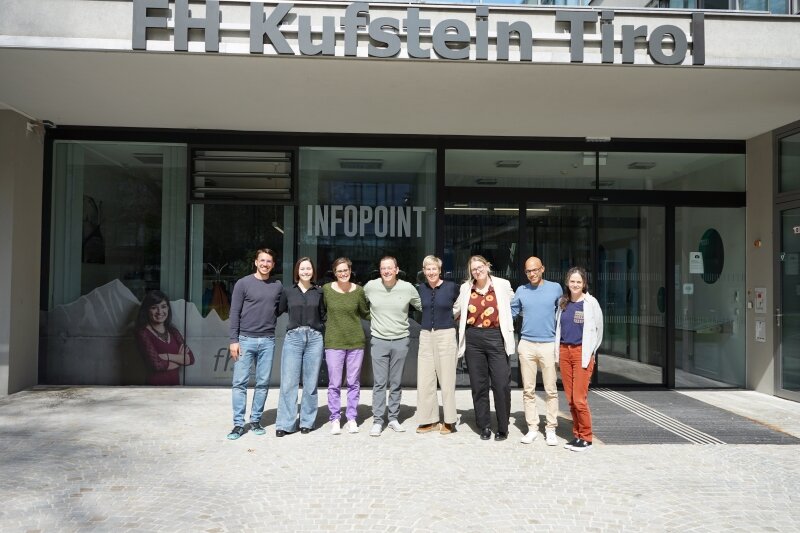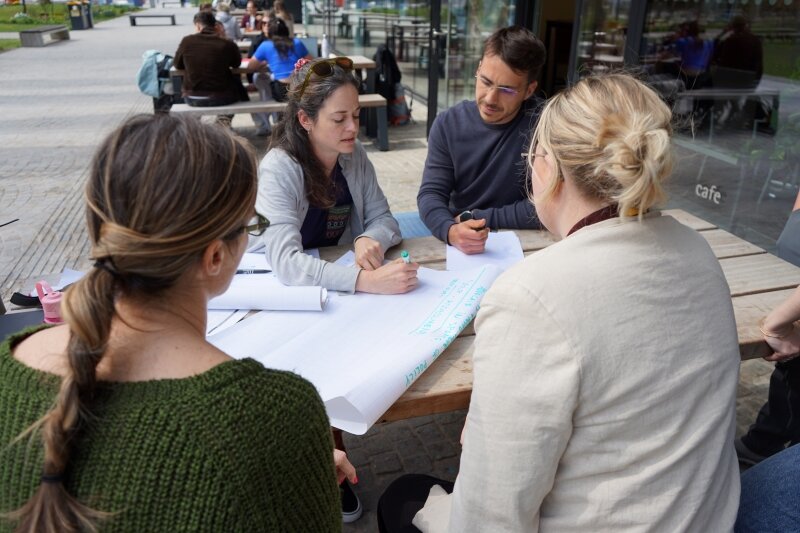DEVELOPMENT OF A TOOLKIT FOR SPORTS POLICY CHANGE
- 19.08.2025
- Research

Caption: Gerard Yelamos (Munster Technological University), Sally-Ann Jennifer Fischer (German Sport University), Dóra Gottgeisl (Second Change Sport Association), Louis Moustakas (FH Kufstein Tirol), Karen Petry (German Sport University), Alana Richardson (German Sport University), Ansley Hoffmann (FairPlayPoint), Talia Kaufmann (SportandDev.org) use their ideas to open up new perspectives for other people.
The seven partner organizations of the Policy Advocacy for Sport and Society (PASS) research project met in April to advance the development of digital tools. The aim is to empower sports stakeholders across Europe to effectively and sustainably influence sports policy.
In mid-April 2025, the PASS consortium met at the University of Applied Sciences Kufstein Tirol to advance the development of a toolkit and curriculum for a digital learning course. Starting in 2026, these materials will be made available to the general public to empower organizations and individuals across Europe to actively shape sports policy change.
Eight representatives from Germany, Portugal, Spain, Austria, Hungary, and the Czech Republic met in person in Kufstein, while two other partners joined virtually. The meeting was hosted by Prof. (FH) Dr. Louis Moustakas, Head of the Institute for Sport and Sustainable Development at the FH Kufstein and project partner in the PASS consortium. Also present was Dr. Karen Petry, co-holder of the new UNESCO Chair in Sport for Development, Peace and Environment and deputy director of the Institute for European Sport Development at the German Sport University Cologne.
Sport as a tool for political advocacy
Sport has enormous potential to drive social change and promote sustainable development. However, in order to make targeted use of this influence, actors in the field of sport for development need practical tools and targeted support. This is where the Policy Advocacy for Sport and Society (PASS) research project comes in: the toolkit and e-learning course provide users with effective instruments to make their political demands visible to government and civil society and to promote sustainable activities.

Participants during the brainstorming process for the development of a new toolkit for digital learning at the PASS consortium meeting at the University of Applied Sciences Kufstein Tirol.
During the meeting, the objectives and content of the planned toolkit, which is being developed jointly with international partner organizations, were specified. It is intended to encourage organizations working in the field of “sport for development” to take a political stance and actively advocate for better framework conditions. The accompanying structured online course provides in-depth knowledge, practical approaches, and concrete strategies for political advocacy at the local, national, and international levels. The aim is to provide targeted support to committed individuals and organizations in raising the visibility of their work and making their programs accessible to as many people as possible. This will not only strengthen sport-based engagement in technical terms, but also broaden its impact as a social force.
Working together for change in sports policy
The PASS project is the first of its kind in Europe in which academic institutions, civil society organizations, and NGOs are working together to strengthen advocacy in sports policy. The meeting provided a valuable opportunity to discuss key questions and coordinate joint work for the coming six months.
A highlight of the meeting was a tour of the state-of-the-art podcast, animation, and video studio at the Kufstein University of Applied Sciences, which inspired the project partners to think big when developing the content and tools for the learning course. With new ideas and innovative tools, the PASS consortium is now motivated to enter the next phase of the project to further strengthen the influence of sport on social change.
Links:
- PASS | project page
- Institute für Sport und Nachhaltige Entwicklung | website
